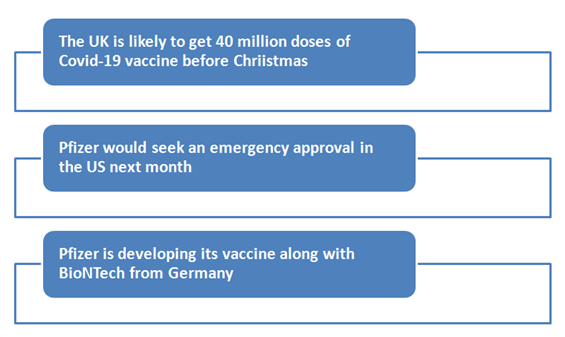Summary
- Pfizer said that after receiving the necessary approvals, stacks of its Covid-19 vaccine would be ready for dispatch from its production unit.
- An emergency approval for Pfizer’s vaccine would be sought in the US in November 2020
- Pfizer is developing its potential vaccine for Covid-19 disease along with BioNTech from Germany.
Amid the recent spike in the Covid-19 cases, there have been stricter lockdown measures to check the spread. The festive spirit in the UK could be sparked with the news that Pfizer Inc., a pharmaceutical company from the United States (US), would deliver 40 million doses of the vaccine. Ben Osborn, Managing Director of Pfizer UK, said that the company has loads of its Covid-19 vaccine ready to leave the production line once it gets the necessary go-ahead.
Last week, the spirit of people was diminished when Andrew Pollard, head of the Oxford vaccine project driven by British pharmaceutical major AstraZeneca Plc, said that the initial jabs were unlikely to be available until 2021.
Pollard added that the frontline workers would be given priority for getting the first shots of its vaccine.
It is to be noted that Pfizer is developing its Covid-19 vaccine along with Germany's BioNTech. The vaccine is going through clinical trials and the statistics from the final stage is due imminently. Showing his optimism, Osborn has said that Pfizer has got several hundred thousand doses of its vaccine at the company’s Belgium unit.
However, at the same time, he emphasised that before anybody would get the shots, the pharmaceutical company and the authorities would ensure that the vaccine was safe.
He added that the clinical trials are yet to be completed and thereafter the vaccine would undergo the regulatory process. In case Pfizer comes out successful in two of the mandatory steps, the company has the physical products available for roll-out. Among the 44,000 participants in the late stage human trials, children were also tested.
In the race to launch a vaccine
Though Pfizer is manufacturing the vaccine at risk and scale, the pharmaceutical giant insisted that it would not cut any corners in a race to launch its vaccine. While in 2020, it promised to make available 100 million doses, there would be at least 1.3 billion in 2021. The vow to make such doses available would depend upon the vaccine manufacturer securing the green light. Of the above mentioned 100 million doses, 40 million doses are expected to reach the UK so that 20 million people could be given two doses each.
So far, in its coronavirus programme, Pfizer has put in around $2 billion. In case, the vaccine does not become successful, the pharmaceutical major may write off this investment. Pfizer has additionally begun initial clinical trials for cure drugs on humans for a specialised treatment. The drug would be provided through an intravenous infusion, including a drip. Once the medicine starts showing desired results, Pfizer would focus on scaling up its production. The pharma giant hoped to bring a medicine that would disrupt the virus and stop from deteriorating the patient’s condition.
It is to be recalled that in 2014, Pfizer attempted a hostile takeover of British competitor AstraZeneca. Many experts believed that AstraZeneca did a right thing by moving alone and developed a potential covid-19 vaccine candidate. Currently, Pfizer is focusing on developing its own treatments. The New York-based company’s profits that suffered during the lockdown seems to be on a decent track. In the US, its Covid-19 jab has been touted for $20 per dose.
The cheering news of Pfizer’s vaccine likely to come as a Christmas gift came as Jonathan Van Tam, Deputy Chief Medical Officer of the UK said a potential vaccine, which was being produced by AstraZeneca and Oxford University, is expected to enter the third stage of clinical trials in December 2020 and would be rolled out just after Christmas. Van Tam has said that Britain was not light years away from a potential Covid-19 vaccine.

As the world awaits
All the necessary details regarding the development of the Covid-19 vaccine has been closely watched around the world. Despite progressing at a greater speed than other vaccines, scientists could not meet the most ambitious deadlines that they had set earlier during the pandemic. It is to be noted that they hoped that a vaccine could be approved by the autumn of 2020.
It is believed that in the US, an emergency approval for the Pfizer vaccine would be sought during November. In the meantime, several staff members of the National Health Service in the UK would be provided training on administering vaccine doses to people. This training would guarantee that the vaccine could be rolled out to the most vulnerable groups without wasting any more time.
Besides, PM Johnson along with his scientific advisors played down the likelihood of the vaccine being available imminently. Although, it was hoped that behind the scenes, things were more positive. According to the media reports, Professor Van Tam has mentioned that a potential vaccine for Covid-19 illness was not too far off from the UK.
Talking about the timeframe regarding the availability of the vaccine, he further added that this was not a completely out of reach proposition that a vaccine could be set out soon after Christmas. This situation meant that there would be a considerable impact on hospital admissions and fatalities.
Professor Jeremy Farrar, a member of the Scientific Advisory Group for Emergencies (Sage), sounded less optimistic about the availability of the vaccine. He stated that although there is still a hope of early breakthrough, there is at least three to six months left for either a vaccine or an effective treatment to be rolled out. He emphasised that it was exceedingly improbable for a Covid-19 vaccine to be ready by Christmas this year.
On 19 October at 11.13 AM, Pfizer’s CREST Depository Interest (CDI) listed on London Stock Exchange (LSE) was at a value of $37.40. The stock’s one year low/high range was recorded to be 28.40 / 40.70 with a negative year-to-date (YTD) return of 3.98 per cent.
Conclusion
Since the outbreak of the coronavirus pandemic, a successful vaccine for the highly infectious respiratory illness has been the most awaited thing. However, safety of the vaccine has remained a priority for the vaccine makers and the governments. In recent times, there have been several reports and studies that have revealed that many people would not opt to get a vaccine dose as soon as it would be launched. It would be interesting to see how difficult it would be to roll out the vaccine.





